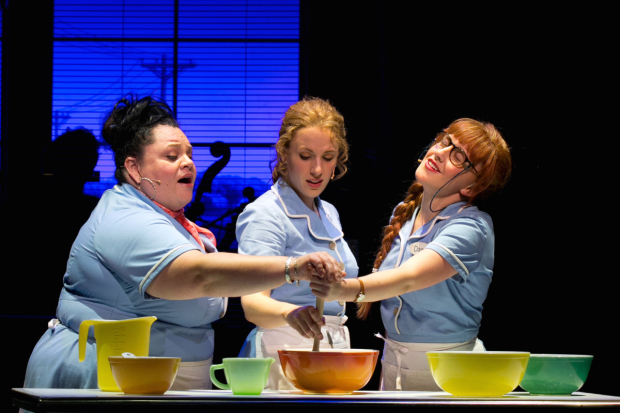Waitress
Sara Bareilles’ Broadway-bound musical receives its world premiere at the American Repertory Theater under the direction of Diane Paulus.

(© Evgenia Eliseeva)
Just one year after director and American Repertory Theater mastermind Diane Paulus delivered the world premiere of the Broadway-bound Finding Neverland, she’s back at it again with Waitress, a brand-new musical based on the charming 2007 film. While some ingredients in this theatrical confection are top-notch, on the whole, the production needs a little more time in the oven.
Somewhere in the South at a local pie shop, we find Jenna (played by Tony Award winner Jessie Mueller), a waitress whose inventive pies are the heartbeat of the joint. Stuck in an abusive and unhappy marriage with her husband, Earl (Joe Tippett), Jenna suddenly finds herself pregnant and, for the first time in a long time, looking for a way out. Will her ticket out be her talk-of-the-town pies, or could it be the passionate love affair that is heating up between her and her OB-GYN, Dr. Pomatter (Drew Gehling)?
Mueller’s performance is undoubtedly one of the most compelling reasons you’ll have to leave your house this season. Her ability to extract raw emotion, quiet humor, and weary resignation from a half-baked book by Jessie Nelson, is nothing short of prodigious. Combined with Sara Bareilles demanding and rangy score, Mueller makes the whole package look effortless.
As Jenna’s co-waitresses and closest friends Becky and Dawn, Tony nominee Keala Settle and Jeanna de Waal are delectable. Gehling, looking and acting like the best parts of both Andrew Garfield and Bill Hader, is an adorable Dr. Pomatter with a real gift for comedy. Dakin Matthews, Jeremy Morse, and Eric Anderson also stand out in the small but solid supporting cast.
The main problem with Waitress is that the stakes just never seem high enough. The darker aspects of the story are glossed over so shruggingly that it’s hard to ever feel that Jenna is truly in peril. Her husband, Earl, comes across as more of a Venice Beach burnout than an abusive brute. And with only a few scenes between the two, their relationship ends up being something that we hear about more than we see. While it is important to understand why Jenna fell in love with Earl in the first place, it is more important that the audience see that Jenna’s well-being (and by extension that of her child) is being threatened in a very real way and that leaving him is her only option.
Nelson has constructed a book that barely scratches the surface of the show’s characters. Adhering far too literally (and predictably) to the film, Nelson moves the action along swiftly and delivers some genuine laughs, but too often falls victim to cliché. Director Diane Paulus has fashioned a pretty slice of musical theater pie, but there’s nothing beyond the light and airy meringue. The production lacks depth and emotional texture, with the direction feeling more perfunctory than anything else. Despite setting a generally brisk pace, there are certain moments in the show that feel belabored. The first act comes dangerously close to flat-lining, and while the second act reveals more heart, ultimately the show’s resolution is jarringly fast and unbelievably tidy.
Sara Bareilles has made a career out of writing smart and thoughtful songs that run the emotional gamut, so it is no surprise that her score is well-written. Most of the songs sound like signature Bareilles fare with her characteristic pulsing piano-driven sound. But it would be nice to hear more of a variety, as some of the songs sound as if they bleed into one another. Her ballads, however, are the most successful parts of the score, with the eleven-o’clock number, "She Used to Be Mine," being a true showstopper.
Scott Pask’s diner set is both eye-catching and functional, with a gorgeous backdrop of Highway 27 stretching off into the horizon, that shows just how isolated this small town is. The sound design by Jonathan Deans, needs a little fine-tuning, as the onstage band often drowns out the lyrics. Chase Brock’s choreography is clever, though some of the bigger numbers would benefit from just a bit more movement.
While the film version of Waitress was a quirky and beautiful love letter to the healing power of the creative arts, it was also a serenely relatable tale about how, despite our dreams, life can sometimes sneak in and shake you until you are unrecognizable. As it stands now, the musical Waitress offers no such celebration and is only occasionally satisfying. The show will undoubtedly evolve before it opens on Broadway this spring, but the crust for something special is there. And Mueller is giving a performance that won’t soon be forgotten. Order up.









